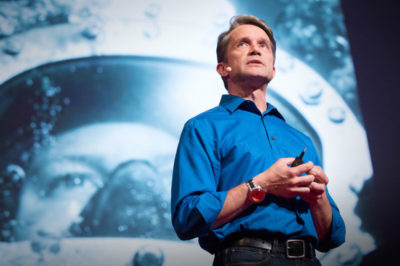
An ocean adventurer is coming to speak at OCU.
Fabien Cousteau, aquanaut and ocean conservationist, will be giving a lecture about the importance of conservation and how it pertains to our world as part of the Martha Jean Lemon Distinguished Speaker Series.
Cousteau is the grandson of Jacques Cousteau, a pioneer of marine conservation. Cousteau grew up on his grandfather’s boat and learned how to scuba dive at age four.
“It’s kind of fascinating. If you dive under, all of a sudden you realize you’ve broken the bonds of gravity to fly freely in any direction,” Cousteau said.
Cousteau is well-known for Mission 31, a science expedition that involved Cousteau and his team spending 31 days underwater.
Cousteau said his stop at OCU is part of a speaking tour he is currently on.
“I have someone who organizes speeches for me around the world, specifically in the U.S.,” Cousteau said.
Cousteau said conservation and ecological awareness is important no matter where you live.
“Whether we are on the ocean front like Florida or a landlocked part of the world like Oklahoma, it’s important to talk about,” he said.
Cousteau said he has a specific interest in sharks, as he saw several species during expeditions when he was younger.
Cousteau said the endangerment of sharks has a heavy impact on the planet.
“It would be a big negative impact on the biodiversity of the ocean, because they do perform a vital role as basically the garbage cleaners of the ocean,” he said.
Cousteau said a lot of the stigma about sharks are perpetuated by the media.
“We love being thrilled by the fictional and non-fictional content,” he said. “These animals aren’t nearly what they are portrayed in Sharknado. The reality is that we are facing a mass extinction of an animal that has been around for 400 million years.”
Cousteau said people should not fear sharks, but rather respect them and be cautious.
“Statistically, there’s a larger chance to get hit crossing the street in New York City, where 35,000 people die per year, or getting hit by lightning, or winning the lottery five times. There are even 33,000 people a year who die of coconut attacks,” he said. “There are less than 100 shark incidents worldwide, a dozen or less are fatal.”
Cousteau said the ocean is a big part of the reason the Earth has been going through ecologic change.
“I keep saying ocean, ocean, ocean, but the ocean has been treated like an endless resource garbage can for decades,” he said. “We dump everything in it and take everything out of it, so it’s no wonder that things are going wrong.”
Cousteau said after his lecture at OCU, he will be traveling to the UN to talk about climate change as it pertains to the ocean.
Cousteau said conservation and low-waste lifestyles affect the ocean and its biodiversity.
“When we’re talking about conservation movements or new ways of generating energy, it’s absolutely part of the wheelhouse of the discussion of ocean exploration and conservation in general,” he said.
Cousteau said college-age students are important to the conservation movement.
“You have the most valuable resource. You have time. You have the opportunity to make change happen,” he said. “People all over the world are taking the initiative to make that happen, whether it’s creating a recycling program or encouraging the local government to implement simple steps. Those are things that need to happen with student bodies. Young people are absolutely instrumental in making that happen. Without college students, these things would never happen.”
Cousteau said small life changes are important to making big changes. He encourages avoiding single-use plastic, as well as getting your community to do the same.
“Less wasteful practices don’t always cost money, and they often can actually save you money,” he said. “Little changes fill the bucket, one drop at a time.”
Cousteau said the conservation movement can also create new platforms and careers for young adults.
“There are a lot of opportunities also when you graduate college to implement new innovative technology, new approaches to traditional platforms, to make positive change and to make a living,” he said.
Maya Ferrer, acting junior, said taking action now is extremely important.
“We literally live on Earth, and if we don’t take care of the Earth, we won’t have a place to live,” Ferrer said. “People don’t recognize how dire the situation is and how we need to take action now. It’s easy to be like ‘Oh, that’s so long from now’ but we’re actually only 15 years from irreversible climate damage.”
Ferrer said attending the talk is important to become more educated on the issue.
“It’s important to become involved with these kinds of things. It’s good to hear professional people talk about these things instead of just seeing it on Facebook and Twitter,” she said. “They are coming to you on campus, and it’s a great resource. You don’t even have to pay.”
Cousteau said bettering the planet is something that will affect us and our descendants forever.
“At the end of the day, you’re going to inherit a better place or a mess, so we need to make sure we don’t give you back things you don’t want,” he said. “I’m a big proponent of having future generations take back what we took for granted.”
Fabien Cousteau will be speaking from 7-9 p.m. on Sept. 24 in Petree Recital Hall in Kirkpatrick Fine Arts Center. Admission is free, but registration is required. RSVP online through the event’s page on the OCU website.


Leave a Reply